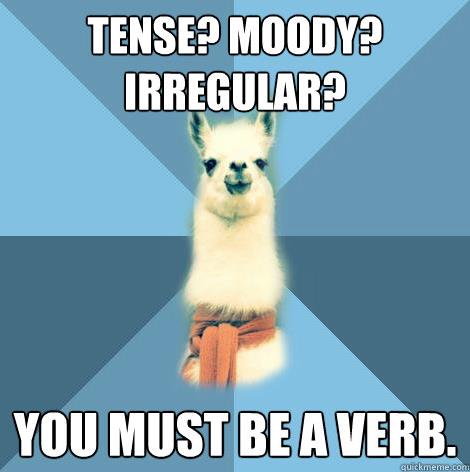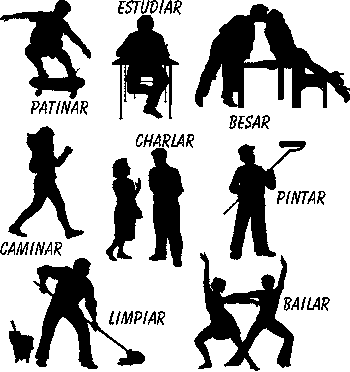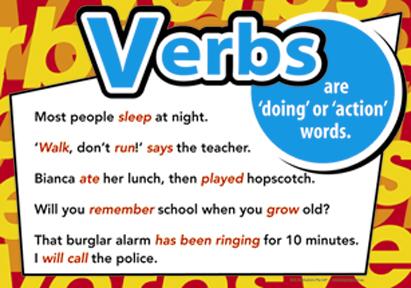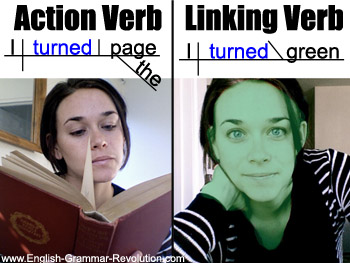La Palabra del Día: "el verbo"
el verbo (vehr'bo)
noun ( verb )
Link: instructions post picture
Saratoga will be helping out with Spanish sentences. There are many native English speakers here, most of us can offer great suggestions to the English sentences. I will do my best to go through them all, too. Please correct your posts according to Saratoga's suggestions.
Use today's Word of the Day in your own Spanish sentence (and include the English translation as well). Try to use the word in a completely new way and vote on the sentences you like best. Then the Word of the Day winner will be chosen.
Guidelines:
Write sentences at least 5 words long, but don't write a paragraph either. Write your Spanish sentence, but include the English translation as well. Make the corrections suggested by other users and moderators in the comments section (try not to use personal pronouns unless absolutely necessary). Use your own words! (Don't use a translator, copy from a book, use song lyrics, etc.) Have fun experimenting with Spanish.
Examples:
1. Es importante saber conjugar verbos correctamente para poder expresarte bien.
It's important to know how to correctly conjugate verbs so that you can express yourself well.
2. Los verbos pueden indicar la acción de la oración.
Verbs can indicate the action of a sentence.
17 Answers
Hay una manera de identificar un verbo.
There is a way to identify a verb.

When the verb "llegar" is accompanied by a verb in infinitive, it has to be followed by the preposition "a". For example:
El verbo llegar cuando es acompañado de un verbo en infinitivo, tiene que ir con la preposición "a", por ejemplo:
- Un día llegaré a ser un buen profesional. One day I will become a good professional.
- Llegaré a ser millonario. I will become a millionaire.

I love the world, so I have learned to conjugate the verb "to love" in many languages / Amo a toda la gente en este mundo, por eso he aprendido a conjugar el verbo "amar" en varios idiomas.

En la lingüística, el término "la conjugación verbal" se refiere a las formas de un verbo según las categorías de persona, número, tiempo, aspecto, modo y voz, mientras que '"la declinación" se refiere a la flexión de sustantivos, adjetivos y pronombres.
In linguistics, the term "verb conjugation" refers to the forms of a verb according to the categories of person, number, tense, aspect, mood and voice, whereas '"declension" refers to the inflection of nouns, adjectives and pronouns.

The most preferable verb to Shakespeare was verb to be.
El verbo más preferible a Shakespeare fue el verbo ser.

Hay muchas expresiones idiomáticas con el verbo "tener".
There are many idiomatic expressions with the verb 'tener'.

El verbo es el palabra que dice lo que acción que está sucediendo ahora mismo.
El verbo para describirme está comiendo ,
siempre comiendo, y relajante.
The verb is the doing word which states what action is, has or will be taking place.
The verb to describe me is ,eating , always eating ,and relaxing.

Los verbos 'ser' y 'estar' en español son diablos en disfrazo.
The verbs ser and estar in Spanish are devils in disguise.

Cuando yo era en colegio, durante nuestras lecciones de gramática, teníamos que dibujar dos líneas debajo de todos los verbos en una oración.
When I was in school, during our grammar lessons, we had to draw two lines under all the verbs in a sentence.

Cada frase necesita un verbo o no es una frase.
Each sentence needs a verb or it is not a sentence.

Totalmente guacamole.= Wholly guacamole . This is not a verb , but an adverb .
I could not resist this for a bit of fun and knowledge.

Lo importante de aprender las idioms es dominar los verbos.
The important thing about learning languages is mastering the verbs.
Italics= Uncertainty

When I get to learn new Spanish verbs, I tend to make this face:
Cuando tengo la oportunidad de aprender los verbos nuevos en español, suelo poner esta cara:
Para muchas personas que hablan inglés, la conjugación de los verbos españoles es muy difícil. Especialmente por el subjuntivo, el cual no se usa mucho en inglés.
For many English speakers, conjugation of Spanish verbs is very difficult. Especially because of the subjunctive, which is not used often in English.

Los verbos son los músculos de un idioma... lo hace mover.
Verbs are the muscles of a language... they make it move.











